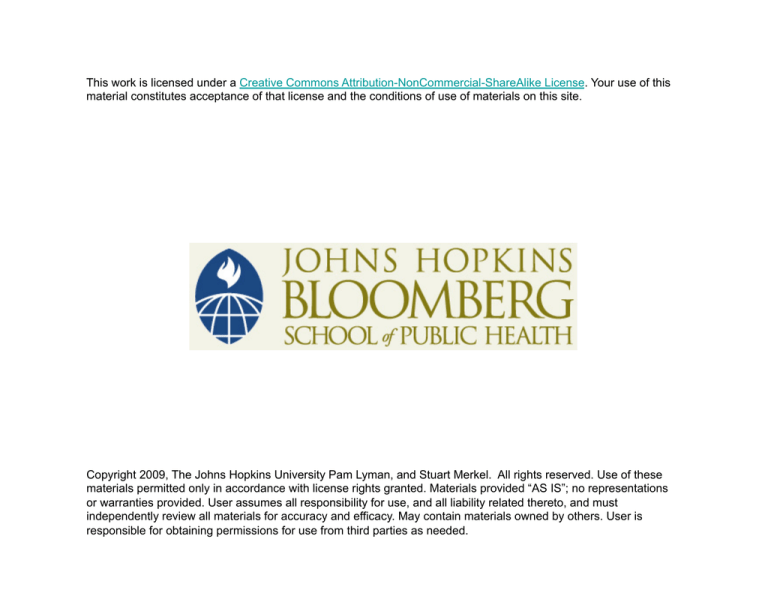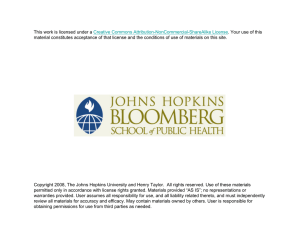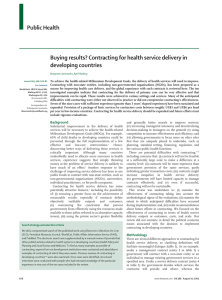
This work is licensed under a Creative Commons Attribution-NonCommercial-ShareAlike License. Your use of this
material constitutes acceptance of that license and the conditions of use of materials on this site.
Copyright 2009, The Johns Hopkins University Pam Lyman, and Stuart Merkel. All rights reserved. Use of these
materials permitted only in accordance with license rights granted. Materials provided “AS IS”; no representations
or warranties provided. User assumes all responsibility for use, and all liability related thereto, and must
independently review all materials for accuracy and efficacy. May contain materials owned by others. User is
responsible for obtaining permissions for use from third parties as needed.
Urban Health in Developing
Countries
Live Talk 2
Urban Health Issues
14 April 2009
2
Overview of Live Talk
• Our course has three planned live talk
sessions
• Each session will be divided into two parts
– First we will have a guest speaker who will
share some experiences
– Secondly we will take questions and
comments from the BBS and respond to them
• As time allows we will encourage
additional questions for our guests and
about the current Module
3
Part Two
Comments and Discussion from the
BBS
Note that portions in red are to
stimulate class discussion
4
Key Theme – Coordinating the
Players
Public Sector
NGOs
Private Sector
The
Community
5
Public vs Private …
• A Student asks whether motives of the
public and private sector are all that
different
• Neither seem to be interested in ‘the
greater public good’
• Staff in both are concerned about personal
profit
• This gives rise to the question of
corruption
6
Are they so different?
• A student adds that when there is basic
lack of infrastructure and supplies in the
public sector, no wonder health workers
don’t care
• Abdullah Baqui responds that there are
multiple providers for health services that
have little or no coordination, usually
leading to under-provision of critical
services in the poor areas …
7
Public and Private Challenges
• The government services are not well
developed which may be an opportunity to
create alternative approaches
• The private sector provides a large
proportion of health services in urban
health markets
• However, there are problems with both
affordability and quality of private services
8
Poor Quality at High Cost
• Several studies document that the urban
poor spend a disproportionate share of
their income on poor quality health care,
much of it from the private sector
• Because private providers’ curative care
services are largely unregulated and they
rarely engage with public health programs
for preventive care
9
NGOs help but are fragmented
• Private sector contribution to improving the
health of the urban poor is minimal
• NGOs and charitable organizations help fill the
gaps, but their services are usually not
comprehensive, and they are fragmented in
terms of geographic coverage
• The challenge is how you develop a
coordinated, cost-effective system for urban
residents or at a minimum develop a safety net
for the poor
10
Contracting
• Several recent experiments with
contracting of health services provide one
possible viable alternative
– Contracting is a means of ensuring
accountability
• What are your ideas to fill these gaps in
quality services?
11
Three questions
A student raises 3 questions from the foregoing
discussion
1. How can civil society play a role in setting a
standard such as a min package of services for
a peri-urban community in the setting of a good
for nothing government?
2. Examples of programs with public-private
collaboration? Why would private sector be
interested in collaborating?
3. Why are private practitioners the main
providers in many urban cities?
Can you offer some answers?
12
Lining Pockets
• A student offers more observations on
government problems
• In many of the developing countries where I
have worked, the governments show little
stewardship in ensuring delivery of services.
– Many of the government officials, workers are so
corrupt that public and donor money targeted for
vulnerable groups is used to line their pockets
– I also agree with all of you that the governments are
rarely interested in the greater public good
13
• As a student says, “I’m not sure I
understand how and why effective
planning could change this
• Do any of you understand?
• Back to an earlier comment – is it a desire
for bribes or a wish that clinics had the
infrastructure and supplies to make the
work fulfilling?
14
Lack of Regulation
• A student also sees a connection between
public and private and it is not a pretty picture
• The Ministries of Health often are not able to
regulate their own public hospitals and clinics,
even with external WHO (and other partner)
support, so one wonders how they could
adequately regulate all of the health providers in
the urban area
• I suspect that with government regulation,
corruption would continue as private clinics and
individuals may be able to bribe their way into
receiving accreditation despite inadequate
provision of services – what do you suspect?
15
Invisibility
• Finally a student explains that the poor are
often invisible – not living in places where
they are counted
• She wonders is efforts toward universal
coverage would help
• What solutions can you offer?
16
Different Types of Community
• A student also points out that in urban areas
churches appear to take the place of
‘community’, But then people go home and still
live isolated from their neighbors
• Bill Brieger suggests that people belong to
many social networks that may not overlap with
their geographical area of residence – coalitions
bring these together
• What is your experience with urban
communities?
17
Action without a budget
• A student says she am interested in any ideas/
models that would help people that work on a
more grassroots level
• I do not work on a level (or have the staff,
funding) to "create a system“
• I am just trying to help with training community
health workers in the area of disease prevention
through education and very basic daily acts that
can affect their health (safe sex, water
sanitation, etc.)
• How can community action get started?
18
Community Involvement
• A student relates a similar concern
• Here at Hopkins, we always learn about
community involvement. To what extent, in
urban areas, is community involvement
utilized when it comes to healthcare
provisions?
• Let’s think again how to utilize some of the
existing networks – plus other ideas!
19
What is the Voucher System?
• A student notes that she was hoping we
could talk a little more about the "voucher
system" that was mentioned in lecture 6.
Not sure I'm clear on how that works.
• There are vouchers for specific services
that may allow one to get the service or
commodity free or at reduced cost – what
are your experiences and who pays the
difference?
20
Other Questions
• Thanks for your comments and thoughts
• Are there any more questions
– For the guest speakers?
– For the course instructors?
21
Thank you
• Thank you for attending
tonight’s Live Talk
• Please remember to
complete the evaluation
• Contact us any time you
have questions
22




